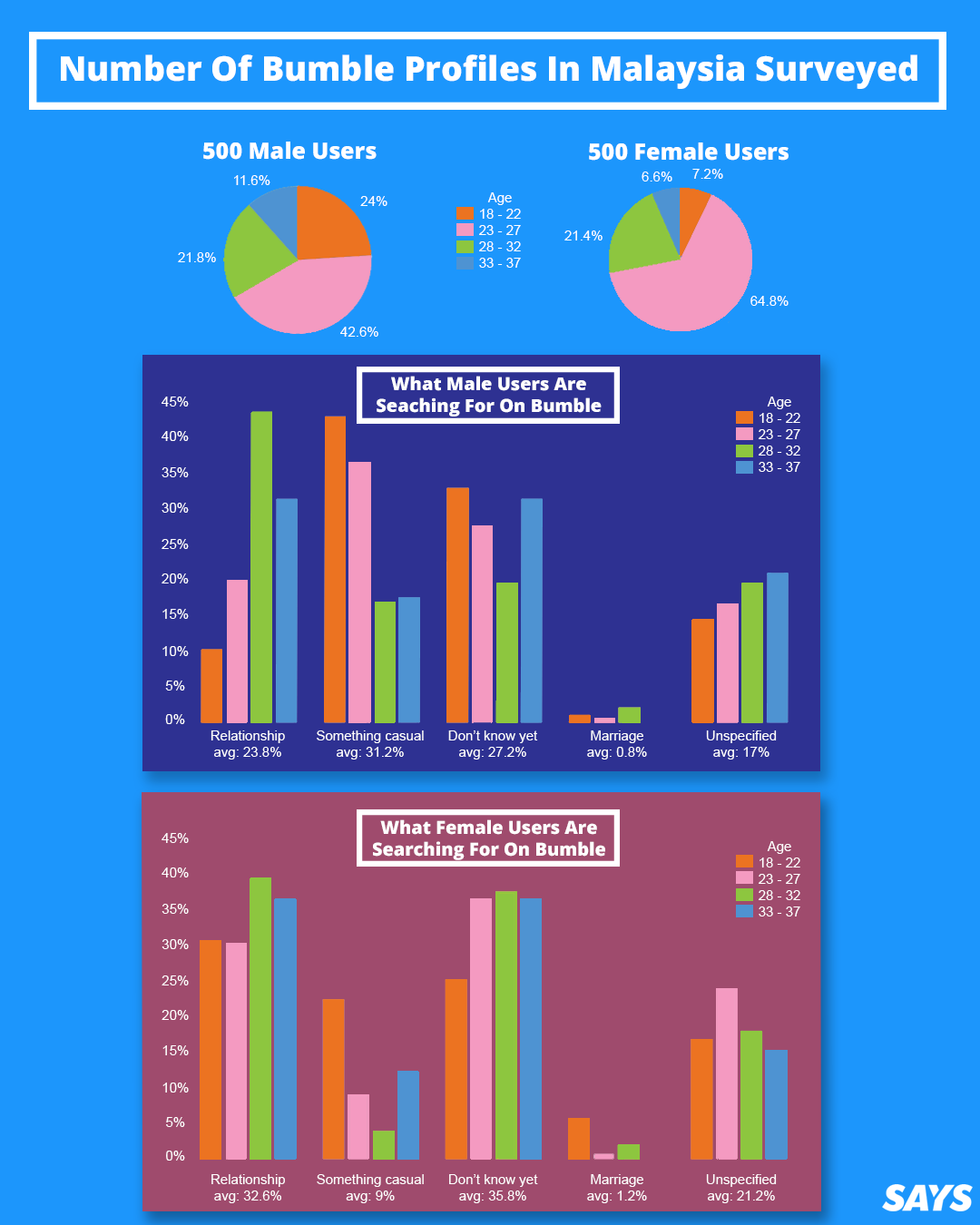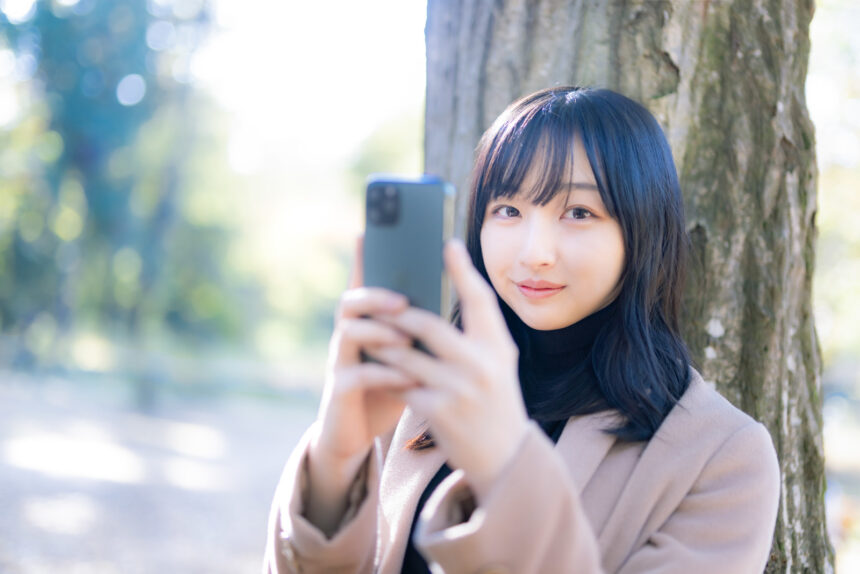How Many M'sians Look For Love Online & How Many Want 'Casual Sex'? We Investigate
SAYS surveyed 1,000 profiles on Bumble and found that the younger the users are, the more likely they are to engage in casual relationships.
Dating apps... the virtual space many of us do not publicly admit that we are on and immediately swipe left on people we know in real life
There is some form of shame associated with the platforms among Malaysians, and users who are not looking for serious relationships on the apps receive an even harsher bad rap for it.
However, there is no denying that bachelors and bachelorettes in Malaysia these days are getting increasingly more confused with what they are looking for in the dating world.
In a survey SAYS conducted on Bumble — a popular dating app that allows users to choose whether they are looking for "relationship", "something casual", "don't know yet", or "marriage" — 31.5% of users chose "don't know yet" on the platform.
It is followed closely by relationship seekers at 28.2%, while 20.1% of users are looking for "something casual".
The survey was conducted by going through 1,000 male and female profiles, and we noted down the users' ages and what they are looking for on Bumble.
We found that users aged between 18 and 22 are more likely to engage in "something casual" — 42.5% for men; 22.2% for women, a significantly higher percentage compared to users of other age groups.
Below is a snapshot of our findings:
With the findings in our hands, we spoke to two experts to pick their brains and understand what these dating app users are thinking when they are swiping behind their smartphones
We consulted practising clinical psychologist at Growing Space Psychology Center Thong Shu Yi, and social psychology and quantitative researcher in interpersonal perceptions and sexuality Dr Goh Pei Hwa, to understand why users in Malaysia are 'confused' in the dating world; why younger users are more likely to engage in casual relationships; and the different behaviours between male and female users; among other focal points of interest.
When asked whether dating apps have changed the method of courtship between men and women, and if the change good for us, Thong and Goh are of the opinion that online dating — like any modern technology for that matter — can be both good and bad.
Thong said that dating apps allow users to meet new people of different backgrounds or from any part of the world, which can be a difficult thing to do especially for people who have left colleges and schools.
She contended that it also offers a sense of safety for users, as they are able to get to know someone through texting before going out on a date.
"On the flip side of a coin, that sense of safety can also bring about a sense of risk because they have to worry about being catfished as they don't know whether the person they're talking to is actually what they claim themselves to be," Thong continued.
She added the other downside of dating apps is that the first interaction between two parties has now been reduced to only conversing through texting, and with the absence of face-to-face interaction, users' sense of humour while texting has become more important.
Goh shared the same sentiment, too, as she argued that humans have always been visual beings, but dating apps users, in particular, tend to make very quick judgements based on physical appearances due to their higher reliance on visual cues
The professor took the view that dating apps have spoiled users with high availability volume of mates — which can be good or bad — and cause them to become pickier when choosing a partner.
"By being 'pickier', it means they are able to choose better 'quality' people. But are we really able to judge 'quality' just based on looks?" she said.
"It's also making us set unrealistic expectations. One thing that happens here is that when you are given so many options, it's great when all options like you, but when a lot of options don't like you... When you don't get a lot of matches... It actually makes people feel worse about themselves."
The other disadvantage dating apps pose is an addiction problem, as the platforms often include gamification elements to increase engagement among users.
Goh said, like other addictions, quitting dating apps can be difficult and may lead to withdrawal symptoms and relapse. She explained this is why some people tend to delete the apps only to reinstall them a few months later.
Psychology professor and quantitative researcher in interpersonal perceptions and sexuality, Dr Goh Pei Hwa.
Image via Dr Goh Pei Hwa via The Edge MarketsOn the discussion about why the majority of users chose 'don't know yet' on Bumble — which is ironic as dating apps were invented to get people into relationships — Thong said the option gives users a 'safety net'
Thong deduced that perhaps those users really do not know what they are looking for, as they don't know who they will meet on the platform. Hence, they take the approach of 'follow the flow and see where things go'.
"I suppose maybe they pick 'don't know yet' is because it's almost like a safety net, just in case, you know, they meet someone who is not really such a good fit, then stick to casual dating," the clinical psychologist said, adding that the option increases their opportunities to meet the right people.
As for Goh, she believed that there may be more to the 'don't know yet' than it seems
"If I had to guess, I would say that 27% of men (who chose 'don't know yet') actually want casual relationships and 35% of women (who chose 'don't know yet') actually want committed relationships," she said.
"If I had to guess the women who say that they are looking for something casual, half of them at least actually want a relationship."
Concurring with Thong, Goh said that the "don't know yet" option allows users to cast a wider net, adding, "So users get the people who think 'Oh, they might want a relationship' or they get others thinking they might be into something casual."
"So I think it's a smart strategy to actually widen the net."
She said the option allows users to use ambiguity to their advantage.
Meanwhile, when asked why more male users are looking for "something casual" as compared to female users — 31.2% for men; 9% for women — Thong said it could be linked to vulnerability associated with sexes
"[There are different] expectations on different sexes. I think maybe women, in general, are not that they don't look for something casual... It might be related to a sense of vulnerability," she said.
Earlier, the clinical psychologist, who often works with young patients, said that female users who chose "don't know yet" could be looking for "something casual" but do not want to be judged for that.
"So there are all these types of stereotypes associated with different kinds of [relationships] you're looking for."
Drawing an example with users from the other end of the spectrum, Thong argued that young male users could be worried about how they would be perceived by female users when they chose "marriage" on their profiles, whereas it is more acceptable for women to forwardly look for "marriage" on dating apps.
On the other hand, citing research and statistics, Goh said that men tend to enjoy dating apps more than women
She also brought up parental investment theory to explain the differences in dating preferences between the sexes.
Parental investment theory argues that the sex that has to invest more in their offspring will be more selective when choosing a mate, while the less-investing sex will have competition between themselves for access to mates.
In the case of human beings, women generally tend to be more discriminating and more sociosexually restricted as they have to undergo pregnancy. Thus, they are more likely to be selective when choosing a mate in order to have children with someone possessing good genes and resources.
Men who do not need to undergo pregnancy, however, may increase their reproductive fitness by being unrestricted and having sex with many women. They tend to have a more unrestricted sociosexuality.
"That (parental investment theory) is more of an evolutionary explanation, but related to that is also a more normative explanation, where it is more socially acceptable for men to be romantically or sexually promiscuous than women in general," Goh explained.
Both psychologists acknowledged that young adults tend to be more explorative when it comes to dating, which coincides with the data we collected
42.5% and 22.2% of men and women aged between 18 and 22, respectively, are looking for casual relationships, which is about three and six times more than men and women aged between 28 and 32, respectively.
"A lot of times when you are younger, you are still exploring who you are, such as your identity, what do you like and do not like, [and] your sexuality," Thong explained.
"So, you are really still trying to [build] a sense of establishment in terms of who you are as an individual."
She is of the opinion that people tend to look for different relationships in different phases of life, and that young adults tend to go on a horizontal plane of exploration while dating before exploring deep with a single partner later in life.
Goh explained that the people in the youngest age group in the survey, also known as emerging adults, tend to be more experimental and want to try different relationships.
"It could also be a generational thing. The sexual hook-up culture is around and has always been around. But it's getting more and more acceptable all around the world, not just in Malaysia," the professor added.
She said some people argued that the reason why the hook-up culture is on the rise is because contraceptives have become increasingly more accessible, thus, people are less afraid and are taking on less risk while engaging in casual sex.
Both Thong and Goh agreed that dating apps can be a catalyst to people developing commitment issues.
They contended that dating app users may think that having multiple partners will mean more 'connection', but the lack of deep connection with a single individual will cause them to feel lonely at times.
Thong advised people who wish or are engaged in casual relationships to be truthful and have self-awareness
"I think people need to take responsibility and really be very honest in terms of like what you're here for," she said, stressing that there is no shame to state what they are looking for.
"Because when you are able to be honest, then the other person can take the responsibility to make the decision whether or not they would like to be in this with you."
Thong and Goh also urged people dating casually to always stay safe by practising safe sex prevent sexually transmitted infections (STIs) and undergo regular health check-ups.
Their recommendation for those who are concerned about the danger of going out on dates with people that they are not familiar with is to take safety precautions, such as sending their live location to a friend.





